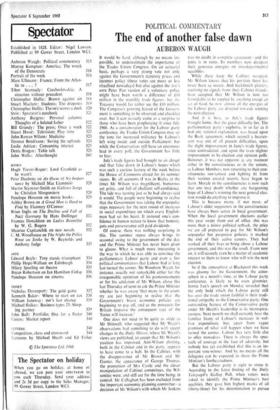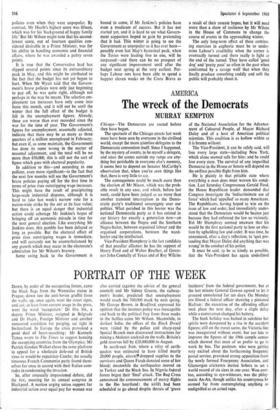The end of another false dawn
POLITICAL COMMENTARY AUBERON WAUGH
It would be hard, although by no means im- possible, to underestimate the importance of the Trades Union Congress. On an actuarial basis, perhaps a very strong vote not only against the Government's statutory prices and incomes policy (these votes are more or less ritualised nowadays) but also against the TUC's own Peter Pan version of a voluntary policy might have been worth a difference of
million in the monthly trade figures: but the Treasury would far rather see the £10 million. The Congress's growing hatred of the Govern- ment is something to be observed and chuckled over, but it can scarcely come as a surprise to those who have been prophesying it since July 1966. As a curtain-raiser for the Labour party conference, the Trades Union Congress may set the tone for increased militancy by Labour's left wing inside and outside Parliament; but while the Conservatives still have an enormous lead in every poll, the Government has little to fear.
July's trade figures had brought to an abrupt end that false dawn in Labour's hopes- which was such a curious feature of the week before the House of Commons closed for its summer recess. By all accounts (I was in Biafra at the time) Mr Wilson was magnificent. humorous yet gritty. and full of ebullient self-confidence. The tide was turning just as he had always said it would. The people were beginning to realise that the Government was taking the unpopular steps necessary for the next round of increases in social expenditure on which every English- man had set his heart. It restored one's con- fidence in human nature to know that honesty, guts and perseverance still paid dividends.
Of course, there was nothing surprising in this. The summer recess always brings its seasonal swing to the government of the day and the Prime Minister has never been given to gloom. What is much more interesting is the way in which he was able to convince the parliamentary Labour party and even a few political commentators that Labour had at lone last turned the corner. Mr Woodrow Wyatt. for instance, usually not remarkable either for the irresponsible optimism of his pronouncements or for his adulation of Mr Wilson. chose this last Thursday of term to ask the Prime Minister whether he was aware 'that many in the coun- try are just beginning to realise that the Government's brave economic policies are beginning to pay off, and as the prospects for Britain improve the consequent rage of the Tories will increase.'
One does not need to be quite as snide as Mr Shinwell. who suggested that Mr Wyatt's observations had something to do with recent changes in the Daily Mirror, where Mr Wyatt's views are published, to accept that Mr Wilson's position has improved. Anti-Wilson plotting. both in, the Cabinet and in the party. appears to have come to a halt. In the Cabinet. with the disappearance of Mr Brown and Mr Gunter, the appearance of George Thomas, the promotion of Mrs Castle and the clever manipulation of Cabinet committees, the Wil- sonites were, and still are for the time being, in control. Mr Callaghan has been excluded from the important economic planning committee—a decision of Mr Wilson's with which Mr Jenkins
was no doubt in complete agreement—and the junta is in ruins. Its members now dissipate their generous energies on interdepartmental squabbles.
While these keep the Cabinet occupied, Mr Wilson knows that his position there has never been so secure. And backbench plotters. receiving no signals from their Cabinet friends, have accepted that Mr Wilson is now too formidable to be toppled by anything except an act of God. So now almost all the energies of the Labour party are directed towards winning the next election.
And it is here, as July's trade figures brought home, that the great difficulty lies. The parliamentary party's euphoria, in so far as it had any rational explanation, was based upon the Basle agreement, which seemed a heaven- sent way out of all present difficulties, upon the slight improvement in June's trade figures, since contradicted, and upon the even slighter improvement in by-election and opinion polls. However, it was not apparent at any moment either in the constituencies or in the unions, as Labour Members, now returning to their con- stituencies sun-tanned and fighting fit from their various coastal resorts, have begun to learn. Morale in the constituencies is now such that one may doubt whether any burgeoning hope of Labour's winning the next general elec- tion would do anything to improve it.
This is because many, if not most, of Labour's older supporters in the constituencies have always been active in local government. When the local government elections earlier this year swept them out of office, this was more than a minor political setback, the price we are all prepared to pay for Mr Wilson's unpopular but purposive policies; it marked the end of their active careers. They had worked all their lives to bring about a Labour government, and this was the result. From now on, it will scarcely even be a matter of academic interest to them to know who will win the next election.
So if the atmosphere at Blackpool this week was gloomy for the Government, the atmo- sphere in a month's time, at the Labour party conference, is likely to be even gloomier. Jennie Lee's speech on Monday revealed that the only hold which the Labour party still has over the trade union faithful is their tradi- tional antipathy to the Conservative party. One outstanding feature of the Conservative party under Mr Heath's leadership is its inconspicu- ousness. Next month we shall certainly hear the familiar litany of Labour's increases in wel- fare expenditure. but. apart from vague promises of 'what will happen when we have turned the corner. Labour has very little else to offer nowadays. There is always the spec- . tacle of courage in the face of adversity, but
nobody has yet established that this is an im- portant vote-winner. And by no means all the delegates can be expected to share the Prime Minister's I ionhea rtcd ness.
But the Labour party is right to stress it. According to the latest finding of the Daily Telegraph's Gallup Poll, when voters were asked to identify the Prime Minister's best qualities, they gave him highest marks of all (thirty-three) for his determination to pursue policies even when they were unpopular. By contrast, Mr Heath's highest score was fifteen, which was for his 'background of happy family life.' But Mr Wilson might note that his second- lowest score, out of fourteen qualities con- sidered desirable in a Prime Minister, was for his ability in handling economic and financial affairs, where he was awarded a paltry seven points.
It is true that the Conservative lead has slipped several points since its extraordinary peak in May, and this might be attributed to the fact that the budget has not yet begun to hurt. When Mr Wyatt said that the Govern- ment's brave policies were only just beginning to pay off, he was quite right, although not perhaps in the way he meant. The selective em- ployment tax increases have only come into force this month, and it will not be until the winter that the full effect of the budget is felt in the unemployment figures. Already, these are worse than ever recorded since the war for the time of year. The Government's figures for unemployment, seasonally adjusted, indicate that there may be as many as three quarters of a million unemployed in February; but even if, as some maintain, the Government has done its sums wrong in the matter of seasonal adjustment, and the total will be no more than 650,000, this is still not the sort of figure which goes with electoral popularity.
In addition to this—and according to one pollster, even more significant—is the fact that the next few months will see the Government's brave policies paying off for the first time in terms of price rises outstripping wage increases. This might have the result of precipitating large-scale industrial disputes, although it is hard to take last week's narrow vote for a nation-wide strike by the AEF at its face value; but there is an equal danger that industrial action could sabotage Mr Jenkins's hopes of bringing off an economic miracle in time for the next general election. Like everything Mr Jenkins does, this gamble has been delayed as long as possible. But the electoral effect of price rises outstripping wages is immediate, and will certainly not be counterbalanced by any growth which may occur in the electorate's admiration for Mr Wilson's bravery.
Some swing back to the Government is bound to come, if Mr Jenkins's policies have even a modicum of success. But it has not started yet, and it is hard to see what Govern- ment supporters hoped to gain by pretending that it had. This winter is going to see the Government as unpopular as it has ever been— possibly even last May's hysterical peak, when the Tories were leading two to one, will be surpassed—and there can be no prospect of any significant improvement until after the budget next spring at the very earliest. Per- haps Labour MPS have been able to spend a happier eleven weeks on the Costa Brava as a result of their roseate hopes, but it will need more than a show of resilience by Mr Wilson in the House of Commons to change the course of events in the approaching winter.
The only long-term effect of these continu- ing exercises in euphoria must be to under- mine Labour's credibility when the corner is eventually turned and there really is light at the end of the tunnel. They have called 'good dog' and 'pretty puss' so often in the past when confronted by a savage wolf that when they finally produce something cuddly and soft the public will probably shoot it.







































 Previous page
Previous page